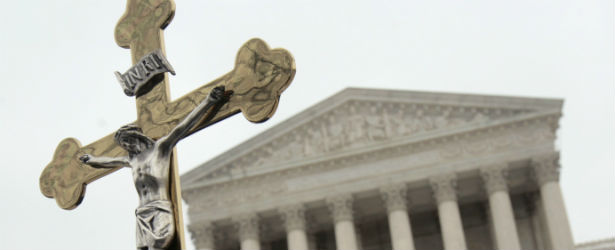Why Are Secular Businesses Claiming Religious Rights?
A new federal court ruling represents an ominous legal trend: Religious freedom is morphing into religious power.
 Reuters
Reuters"Can a corporation exercise religion?" federal district court judge John L. Kane recently asked. He answered his own question with a provisional yes. In Newland v Sebelius, the court granted a commercial enterprise a temporary injunction exempting it, for now, from providing female employees with coverage for contraception and sterilization required by the Affordable Care Act.
Hercules Industries, a private corporation, manufactures and distributes ventilation systems, but this secular business is owned and operated by a Catholic family, which "seek(s) to run Hercules in a manner that reflects their sincerely held religious beliefs." Its recently amended rules of incorporation state that the company is to be guided by appropriate religious, ethical, or moral standards and that the board of directors may "prioritize" those standards over profitability. Following the teachings of the Catholic Church, Hercules does not offer the ACA's required coverage for reproductive health care.
The law exempts religious employers from these requirements, and the Obama administration has offered compromises to Church-affiliated non-profits (compromises that have been the subject of intense controversy and litigation). But the Newland case seeking and at least temporarily securing exemptions from a generally applicable federal law for an entirely secular enterprise is a new frontier.
The injunction in Newland was not based on First Amendment claims but on a federal statute, the Religious Freedom Restoration Act. This act requires the government to demonstrate a compelling interest in regulations that substantially burden religion. In Newland, the district court found the government's compelling interest in uniform application of a public health measure was "undermined" by "numerous exemptions to the preventive care mandate," including contraception care exemptions offered to religious institutions.
In other words, if the law were less accommodating, the government would have a stronger interest in uniformly enforcing it. But if the law were less accommodating to religion, it would have been quite vulnerable to First Amendment challenges. Pursuant to the Court's reasoning in Newland, the government can't win.
Judge Kane did stress that the injunction in this case applied only to Hercules Industries. But while the injunction is limited, the principle on which it's based has extraordinary reach and could dramatically expand legal immunity for religious practices and beliefs.
If religious objections to contraception and sterilization merit an exemption from federal law, then so could religious objections to hiring gay people or single mothers (or married ones, for that matter). Why, after all, should religious teachings on reproduction be privileged over other articles of faith? If the principle underlying the Newland injunction takes hold, it's hard to imagine any strongly held belief of any religious group that would not merit an exemption from a burdensome federal law.
Not long ago (at least not long ago in the life of the law), the Supreme Court emphatically rejected the proposition that the First Amendment requires exempting people from laws that violate their religious beliefs. In 1990, in Employment Division v Smith, the Court held:
The right of free exercise does not relieve an individual of the obligation to comply with a valid and neutral law of general applicability on the ground that the law proscribes (or prescribes) conduct that his religion prescribes (or proscribes).
To make an individual's obligation to obey such a law contingent upon the law's coincidence with his religious beliefs, except where the State's interest is "compelling" -- permitting him, by virtue of his beliefs, 'to become a law unto himself,' ... contradicts both constitutional tradition and common sense.
Congress disagreed. In response to this case, it enacted the Religious Freedom Restoration Act, requiring a compelling interest in laws substantially burdening religion. Eventually, the Court effectively disagreed with the Smith decision, too. In January 2012, in Hosannah Tabor v EEOC, it granted a church-affiliated institution broad, First Amendment-based exemptions from federal civil rights laws.
As I argued here, the decision in Hosannah Tabor demonstrated the Court's evolving, results-oriented approach to First Amendment cases involving the rights and responsibilities of religious organizations. Recent cases demonstrate that for purposes of receiving government support, religious groups are to be treated like secular groups. But for the purposes of complying with generally applicable laws, churches enjoy special status and special immunity as religious groups.
Now, according to Judge Kane's decision in Newland, secular businesses may enjoy similar status and similar immunity under federal statutes, at least, if not the Constitution. His ruling is an initial salvo in what may well be prolonged litigation, but it represents an ominous legal trend: Religious freedom is morphing into religious power. If the rights of diverse employees in a secular enterprise are subject to the beliefs of their employers, then religious people will not simply be laws unto themselves; they'll determine, in part, laws governing the rest of us.